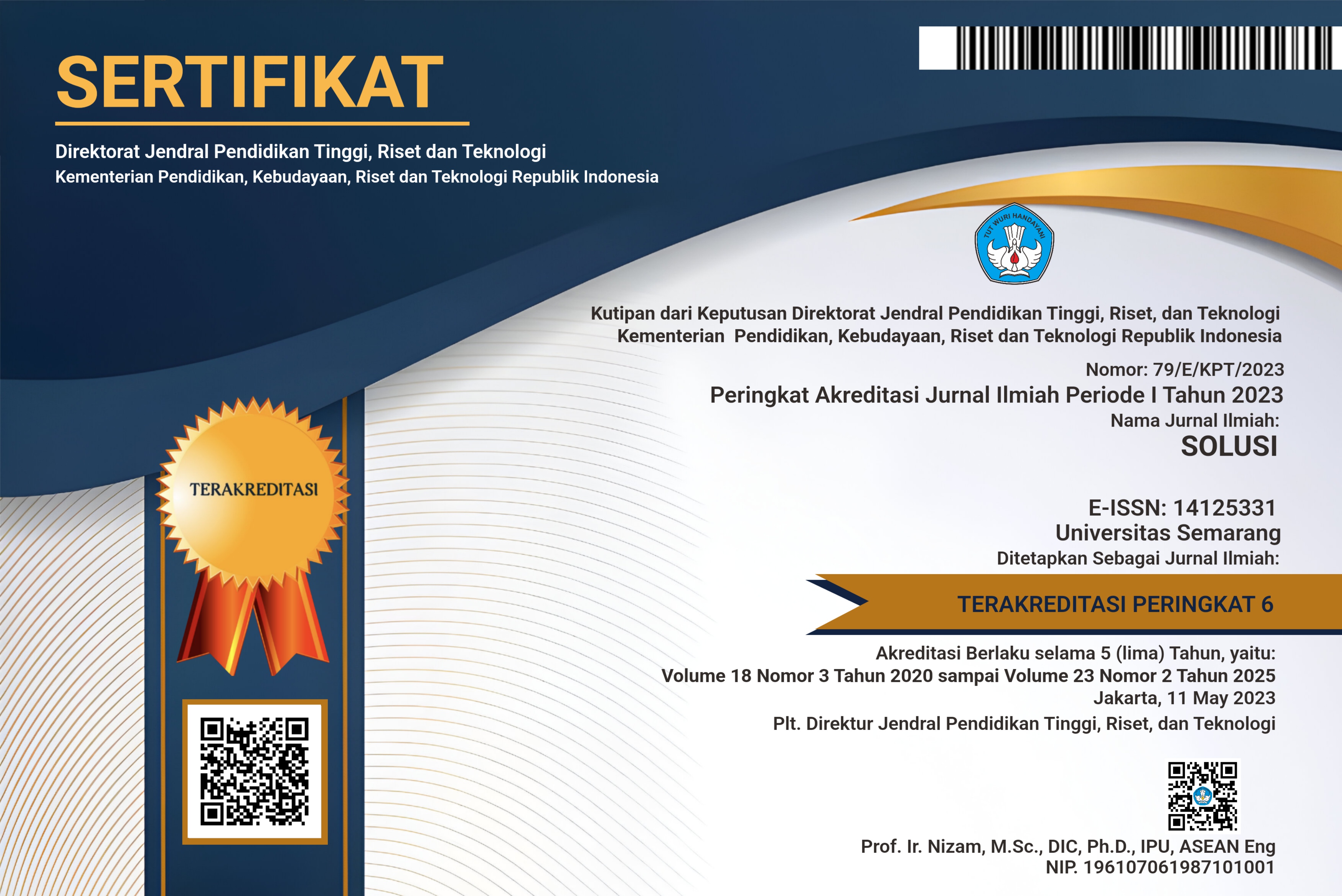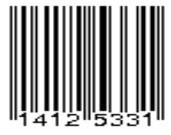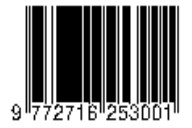Focus and Scope
The aim of this journal publication is to disseminate the conceptual thoughts or ideas and research results that have been achieved in the area of business and economic
Ekuilibrium : Jurnal Ilmiah Solusi, particularly focuses on the main problems in the development of the sciences of business and economic areas as follows:
1. Economic
2. Finance
3. Economic Development
4. Management
5. Accountancy
Section Policies
Articles
 Open Submissions Open Submissions |
 Indexed Indexed |
 Peer Reviewed Peer Reviewed |
Peer Review Process
Articles received by Solusi: Journal Solusi, will be reviewed through several stages: - Submitted article will be evaluated whether it has conformity with the journal template, purpose and scope of the journal, and the methodology used (rejected if it does not meet the criteria)
- Submitted article must be free of plagiarism content, the maximum limit of similarity is 20%. The article will be rejected if the similarity is high, however, the author will be asked for clarification if the similarity is low.
- The submitted article will be reviewed by at least two peer reviewers. Reviewers do not know the identity of the author, and the author does not know the identity of the reviewer (double blind peer review). A review of the article will pay attention to the novelty of the writing, the theory used, the method used, the results and discussion, conclusions, and suggestions.
- Records given by reviewers will be discussed in the editor's meeting to decide whether the article is rejected, requires major revisions, requires minor revisions, or accepted.
- If the submitted article decision is a revision, the author will be contacted to revise the text and must be returned to the editor without delay.
- Authors who cannot submit revisions according to the schedule can contact the editor, to request an extension.
- Authors who do not submit the article after the extension is given, the article will be rejected.
- After the article has been revised by the author and returned to the editor, the editor will make the final decision.
|
Publication Frequency
Jurnal SOLUSI is scheduled for publication in January, April, July and October (4 issue a year). It is electronically published via journal website (http://journals.usm.ac.id/index.php/solusi/index).
Open Access Policy
Solusi : Journal Solusi publishes fully open access journals using CC-BY attribution. All articles are available on the internet to all users immediately upon publication. This journal provides immediate open access to its content on the principle that making research freely available to the public supports a greater global exchange of knowledge. Solusi : Journal Solusi has a policy: - Will not charge users any
- Users are given the freedom to search, read, download, print, distribute, or link to the full text of all articles in Solusi: Journal of Solusi.
Works/articles in this journal as are bound to Creative Commons Attribution 4.0 International (CC BY 4.0). |
Archiving
This journal utilizes the LOCKSS system to create a distributed archiving system among participating libraries and permits those libraries to create permanent archives of the journal for purposes of preservation and restoration. More...
Publication Ethics
Section A: Publication and authorship - All submitted papers are subject to strict peer-review process by at least two reviewers that are experts in the area of the particular paper.
- Review process are blind peer review.
- The factors that are taken into account in review are relevance, soundness, significance, originality, readability and language.
- The possible decisions include acceptance, acceptance with revisions, or rejection.
- If authors are encouraged to revise and resubmit a submission, there is no guarantee that the revised submission will be accepted.
- Rejected articles will not be re-reviewed.
- The paper acceptance is constrained by such legal requirements as shall then be in force regarding libel, copyright infringement and plagiarism.
- No research can be included in more than one publication.
Section B: Authors’ responsibilities - Authors must certify that their manuscripts are their original work.
- Authors must certify that the manuscript has not previously been published elsewhere.
- Authors must certify that the manuscript is not currently being considered for publication elsewhere.
- Authors must participate in the peer review process.
- Authors are obliged to provide retractions or corrections of mistakes.
- All Authors mentioned in the paper must have significantly contributed to the research.
- Authors must state that all data in the paper are real and authentic.
- Authors must notify the Editors of any conflicts of interest.
- Authors must identify all sources used in the creation of their manuscript.
- Authors must report any errors they discover in their published paper to the Editors.
Section C: Reviewers’ responsibilities - Reviewers should keep all information regarding papers confidential and treat them as privileged information.
- Reviews should be conducted objectively, with no personal criticism of the author
- Reviewers should express their views clearly with supporting arguments
- Reviewers should identify relevant published work that has not been cited by the authors.
- Reviewers should also call to the Editor in Chief’s attention any substantial similarity or overlap between the manuscript under consideration and any other published paper of which they have personal knowledge.
- Reviewers should not review manuscripts in which they have conflicts of interest resulting from competitive, collaborative, or other relationships or connections with any of the authors, companies, or institutions connected to the papers.
Section D: Editors’ responsibilities - Editors have complete responsibility and authority to reject/accept an article.
- Editors are responsible for the contents and overall quality of the publication.
- Editors should always consider the needs of the authors and the readers when attempting to improve the publication.
- Editors should guarantee the quality of the papers and the integrity of the academic record.
- Editors should publish errata pages or make corrections when needed.
- Editors should have a clear picture of a research’s funding sources.
- Editors should base their decisions solely one the papers’ importance, originality, clarity and relevance to publication’s scope.
- Editors should not reverse their decisions nor overturn the ones of previous editors without serious reason.
- Editors should preserve the anonymity of reviewers.
- Editors should ensure that all research material they publish conforms to internationally accepted ethical guidelines.
- Editors should only accept a paper when reasonably certain.
- Editors should act if they suspect misconduct, whether a paper is published or unpublished, and make all reasonable attempts to persist in obtaining a resolution to the problem.
- Editors should not reject papers based on suspicions, they should have proof of misconduct.
- Editors should not allow any conflicts of interest between staff, authors, reviewers and board members.
|
Screening for Plagiarism
Papers submitted to Solusi : Journal of Solusi will be screened for plagiarism using ithenticate plagiarism detection tools. Solusi: Journal of Solusi will immediately reject papers leading to plagiarism or self-plagiarism. Before submitting articles to reviewers, those are first checked for similarity/plagiarism tool, by a member of the editorial team. The papers submitted to Solusi: Journal of Solusi must have similarity level less than 20%. Plagiarism is the exposing of another person’s thoughts or words as though they were your own, without without permission, credit, or acknowledgment, or because of failing to cite the sources properly. Plagiarism can take diverse forms, from literal copying to paraphrasing the work of another. In order to properly judge whether an author has plagiarized, we emphasize the following possible situations: - An author can literally copy another author’s work- by copying word by word, in whole or in part, without permission, acknowledge or citing the original source. This practice can be identified through comparing the original source and the manuscript/work who is suspected of plagiarism.
- Substantial copying implies for an author to reproduce a substantial part of another author, without permission, acknowledge or citation. The substantial term can be understood both in terms of quality as quantity, being often used in the context of Intellectual property. Quality refers to the relative value of the copied text in proportion to the work as a whole.
- Paraphrasing involves taking ideas, words or phrases from a source and crafting them into new sentences within the writing. This practice becomes unethical when the author does not properly cite or does not acknowledge the original work/author. This form of plagiarism is the more difficult form to be identified.
|
Withdrawal of Manuscripts
The author is not allowed to withdraw the submitted manuscripts because the withdrawal is a waste of valuable resources. Editors and referees spent a great deal of time processing the submitted manuscripts, and works invested by the Publisher. However, the authors could suggest the withdrawal if there is no updated progress review information after two months from our side.
Invitation to Join the Editorial Team of SOLUSI
SOLUSI invites applications from eligible scholars and researchers to join the editorial board or reviewer team. If you are interested, you could join by visiting: https://bit.ly/JoinUsSolusi Editorial Board Benefits for Editorial Board Members. As part of the community Journal of Solusi, our editorial board members hold a pivotal role. They not only oversee the quality and relevance of manuscripts but also contribute to the shaping and progression of our journals. As an editorial board member with Journal of Solusi, you can expect to be at the cutting edge of developments in your field, interacting with peers, and gaining valuable insights into the publishing landscape. As an Editorial Board Member, You will Benefit from: - Enhance your academic influence and enrich your resume.
- Receive a certificate acknowledging your contributions to the journal.
- Have your name listed on the journal website.
- Network with other scholars in your field and broaden your academic connectivity.
- Enjoy special discounts on Article Processing Charges.
Reviewers Benefits for Reviewers Scholars will be entitled to the following benefits when working with Journal of Solusi as reviewers. - Enhance your professional reputation through peer review involvement.
- Receive a personalized reviewer certificate for your contribution.
- Enjoy exclusive discounts on Article Processing Charges when publishing with Journal of Solusi.
|













